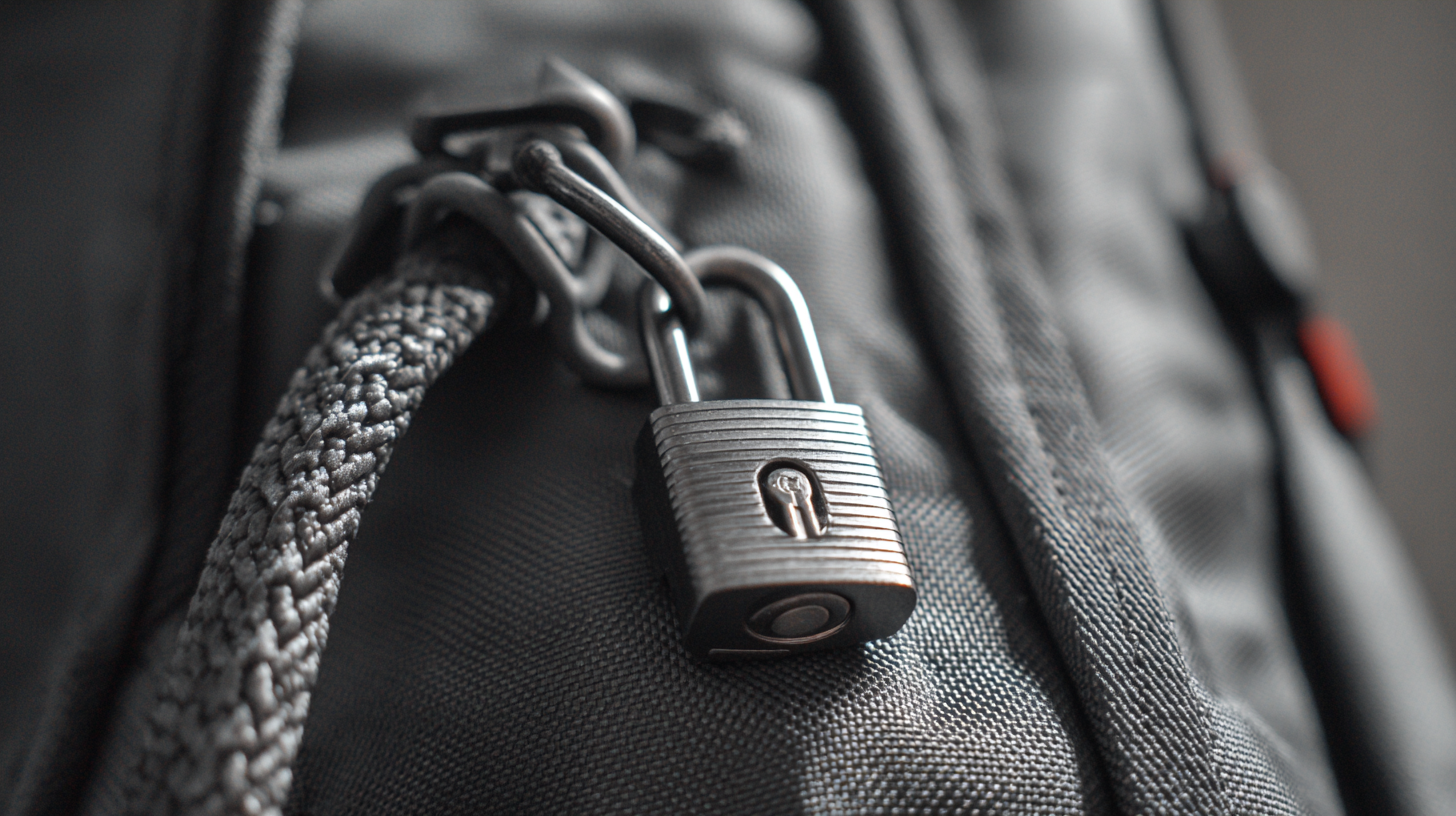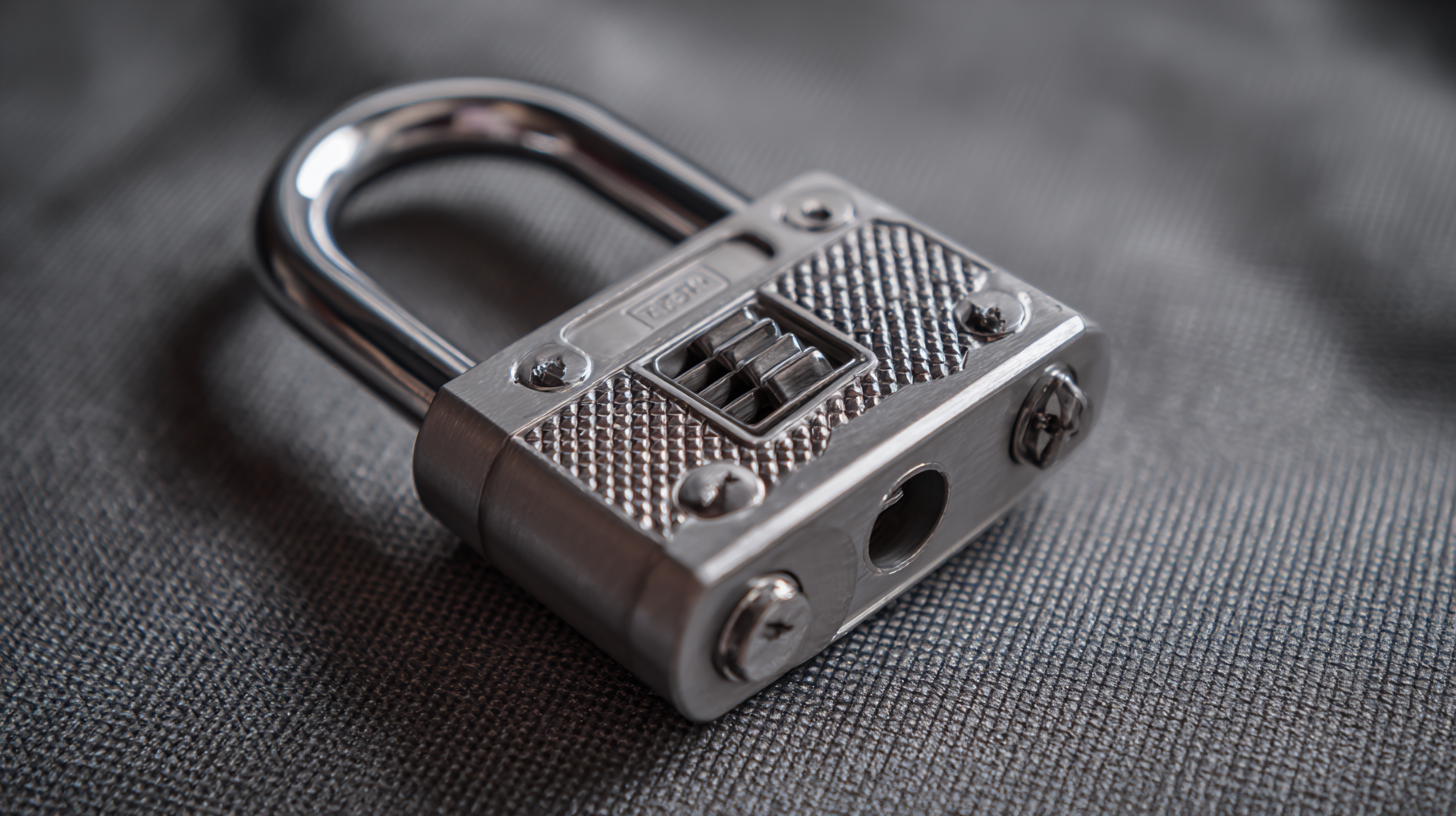 +86-18620643668
+86-18620643668 


In an era where travel and outdoor activities are on the rise, the importance of security in personal belongings cannot be overstated. The global market for travel accessories, including Backpack Locks, is anticipated to grow significantly, reaching an estimated value of $45 billion by 2025, according to industry reports. As safety concerns loom large for travelers, manufacturers are innovating to provide unmatched quality and reliability in their products. Premier Chinese factories are at the forefront of this revolution, leveraging advanced technology and stringent quality controls to produce Backpack Locks that meet diverse consumer needs. This blog will delve into the unmatched manufacturing excellence of these locks, dissecting key reasons why they stand out in a competitive marketplace and how they enhance the overall travel experience for adventurers worldwide.

The backpack lock industry in China has seen significant advancements in craftsmanship and technology, making it a global leader in manufacturing excellent security solutions. According to a report from IBISWorld, the market size of the global backpack lock industry is projected to reach $3.5 billion by 2025, with China accounting for over 40% of this market. This dominates the landscape, thanks to its skilled workforce and innovative production techniques that prioritize durability and user-friendliness.
Chinese factories employ cutting-edge technology, including automated assembly lines and high-precision CNC machining, which enhance the overall quality of backpack locks. A recent survey by MarketWatch highlights that locked backpacks reduce theft by up to 70%, emphasizing the importance of reliable locking mechanisms. In addition, the integration of materials such as aluminum alloys and advanced polymers not only improves the aesthetic appeal of the locks but also strengthens their resistance to wear and tear, aligning with the increasing consumer demand for reliable security products in an ever-evolving market.
In today's competitive landscape, the manufacturing of premium backpack locks has seen transformative advancements driven by state-of-the-art technology. According to a report by MarketsandMarkets, the global market for smart locks, including high-quality backpack locks, is projected to reach $4.4 billion by 2025, growing at a CAGR of 12.6%. This surge highlights the increasing demand for innovative security solutions that are both reliable and user-friendly.

At the heart of this evolution is the integration of advanced manufacturing technologies such as automation, IoT, and AI. These technologies enhance precision in production processes and significantly improve the durability and functionality of backpack locks. For instance, the implementation of robotic assembly lines has reduced production time by an estimated 30%, while predictive maintenance enabled by IoT sensors minimizes downtime and ensures consistent product quality. Furthermore, AI-driven design processes allow manufacturers to rapidly prototype and test new designs, leading to a more agile response to market trends.
As factories in China invest heavily in these technological advancements, they are not only improving the performance of their products but also setting new standards for quality and security in the global market. This positions them as leaders in the backpack lock industry, catering to the evolving needs of consumers who prioritize both functionality and design in their everyday carry solutions.
In today's environmentally conscious marketplace, the Premier Chinese factory excels not only in manufacturing high-quality backpack locks but also in implementing sustainable production practices. The factory has adopted innovative methods that minimize waste and reduce its carbon footprint, ensuring that each lock produced aligns with eco-friendly standards. This commitment to sustainability involves utilizing recycled materials in the production process, which helps conserve natural resources and lowers environmental impact.
Moreover, the factory prioritizes energy efficiency by adopting advanced manufacturing technologies that reduce energy consumption. Solar panels have been installed to harness renewable energy, further contributing to a greener production landscape. Additionally, the factory has established a closed-loop water system, ensuring that water used in the production process is recycled and purified for future use. These sustainable practices not only benefit the environment but also enhance the overall quality and appeal of the backpack locks, making them a top choice for eco-conscious consumers.
In the highly competitive landscape of manufacturing, particularly for products like backpack locks, quality control measures play a pivotal role in distinguishing top Chinese manufacturers from their counterparts. These leading factories implement rigorous testing protocols and inspections to ensure that every product meets international standards. From material selection to the final assembly, each step in the production process is meticulously monitored. This commitment to excellence not only reinforces the brand's reputation but also builds consumer trust, ultimately driving sales in both domestic and global markets.
Moreover, the adoption of advanced technologies, such as automated quality assessment tools, enhances precision and efficiency in manufacturing. These innovations allow companies to identify defects early in the production cycle, reducing waste and improving overall product reliability. As demand for high-quality, durable goods escalates, the best Chinese manufacturers are poised to meet these expectations, positioning themselves for substantial market share growth in various sectors, including the expanding global gaming mouse and keyboard market, estimated to reach $303.66 million by 2033. This intersection of quality control and technological advancement sets the best backpack locks and other products apart, underlining the unmatched excellence of their creators.
| Quality Control Measure | Description | Implementation Frequency | Impact on Product Quality |
|---|---|---|---|
| Material Inspection | Thorough evaluation of raw materials for compliance with industry standards. | Every Batch | Ensures only high-quality materials are used, reducing defects. |
| In-Process Quality Checks | Regular checks during manufacturing to ensure adherence to specifications. | Hourly | Identifies issues early, minimizing rework and waste. |
| Final Product Testing | Comprehensive testing of the final product for durability and performance. | Every Shipment | Guarantees product functionality and reliability for end users. |
| Supplier Audits | Regular audits of suppliers to maintain quality standards across the supply chain. | Bi-Annually | Strengthens overall product quality by ensuring supplier reliability. |
| Employee Training Programs | Ongoing training for employees on quality standards and best practices. | Quarterly | Enhances workforce competency, leading to better quality outcomes. |
As the global marketplace continues to evolve, the impact of Chinese manufacturing cannot be overstated, particularly in the field of backpack locks. Chinese factories are not merely producers but innovators that are setting new standards for quality and efficiency. The rise of the premium backpack lock from these factories exemplifies how high-quality manufacturing can influence international trade dynamics. With advanced technologies and rigorous quality control processes, Chinese manufacturers have positioned themselves as leaders, not just in quantity but in producing superior products that meet the demands of global consumers.

The accessibility and affordability of Chinese backpack locks have opened new avenues for international markets. Retailers around the world are increasingly looking to these products to meet consumer needs, as they combine functionality with design aesthetics. This trend is evident in marketplaces across North America and Europe, where the demand for reliable and stylish security solutions has surged. By leveraging cost-effective production methods while maintaining quality, Chinese manufacturers are not only expanding their market shares but also redefining international trade relationships.
This strategic pivot reflects a broader shift toward collaboration and cultural exchange in the global economy, where quality and innovation from China are influencing the way consumers and businesses engage with manufacturing.
